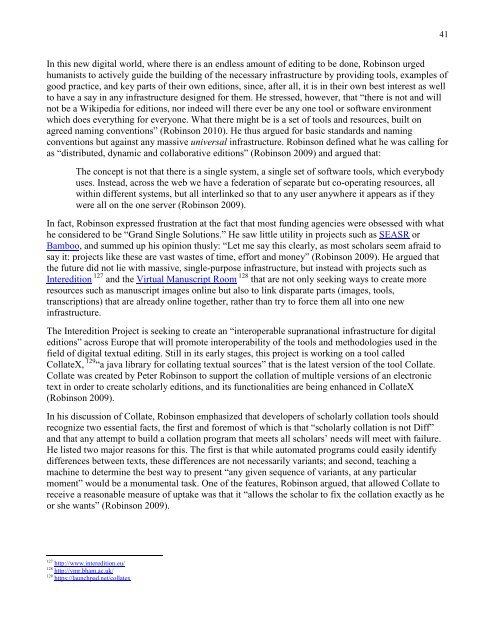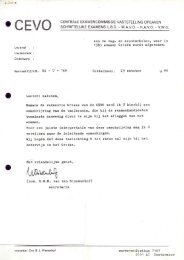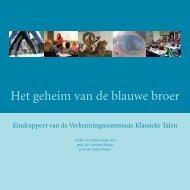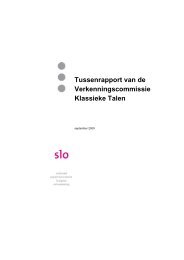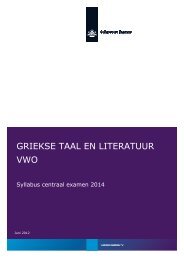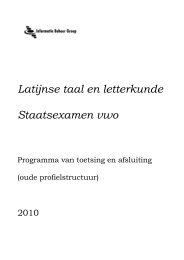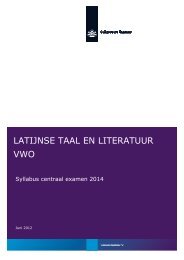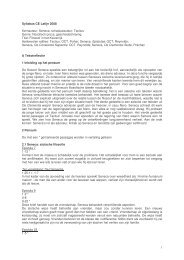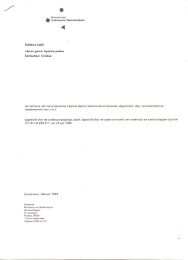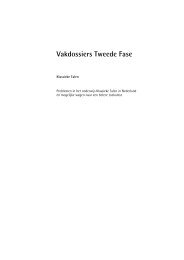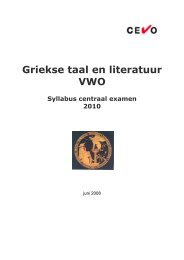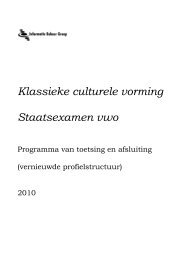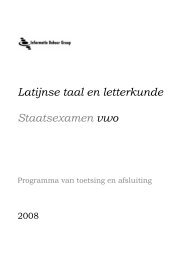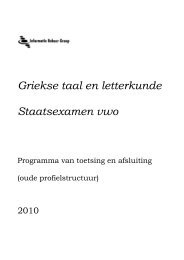Rome Wasn't Digitized in a Day - Council on Library and Information ...
Rome Wasn't Digitized in a Day - Council on Library and Information ...
Rome Wasn't Digitized in a Day - Council on Library and Information ...
Create successful ePaper yourself
Turn your PDF publications into a flip-book with our unique Google optimized e-Paper software.
41<br />
In this new digital world, where there is an endless amount of edit<str<strong>on</strong>g>in</str<strong>on</strong>g>g to be d<strong>on</strong>e, Rob<str<strong>on</strong>g>in</str<strong>on</strong>g>s<strong>on</strong> urged<br />
humanists to actively guide the build<str<strong>on</strong>g>in</str<strong>on</strong>g>g of the necessary <str<strong>on</strong>g>in</str<strong>on</strong>g>frastructure by provid<str<strong>on</strong>g>in</str<strong>on</strong>g>g tools, examples of<br />
good practice, <strong>and</strong> key parts of their own editi<strong>on</strong>s, s<str<strong>on</strong>g>in</str<strong>on</strong>g>ce, after all, it is <str<strong>on</strong>g>in</str<strong>on</strong>g> their own best <str<strong>on</strong>g>in</str<strong>on</strong>g>terest as well<br />
to have a say <str<strong>on</strong>g>in</str<strong>on</strong>g> any <str<strong>on</strong>g>in</str<strong>on</strong>g>frastructure designed for them. He stressed, however, that “there is not <strong>and</strong> will<br />
not be a Wikipedia for editi<strong>on</strong>s, nor <str<strong>on</strong>g>in</str<strong>on</strong>g>deed will there ever be any <strong>on</strong>e tool or software envir<strong>on</strong>ment<br />
which does everyth<str<strong>on</strong>g>in</str<strong>on</strong>g>g for every<strong>on</strong>e. What there might be is a set of tools <strong>and</strong> resources, built <strong>on</strong><br />
agreed nam<str<strong>on</strong>g>in</str<strong>on</strong>g>g c<strong>on</strong>venti<strong>on</strong>s” (Rob<str<strong>on</strong>g>in</str<strong>on</strong>g>s<strong>on</strong> 2010). He thus argued for basic st<strong>and</strong>ards <strong>and</strong> nam<str<strong>on</strong>g>in</str<strong>on</strong>g>g<br />
c<strong>on</strong>venti<strong>on</strong>s but aga<str<strong>on</strong>g>in</str<strong>on</strong>g>st any massive universal <str<strong>on</strong>g>in</str<strong>on</strong>g>frastructure. Rob<str<strong>on</strong>g>in</str<strong>on</strong>g>s<strong>on</strong> def<str<strong>on</strong>g>in</str<strong>on</strong>g>ed what he was call<str<strong>on</strong>g>in</str<strong>on</strong>g>g for<br />
as “distributed, dynamic <strong>and</strong> collaborative editi<strong>on</strong>s” (Rob<str<strong>on</strong>g>in</str<strong>on</strong>g>s<strong>on</strong> 2009) <strong>and</strong> argued that:<br />
The c<strong>on</strong>cept is not that there is a s<str<strong>on</strong>g>in</str<strong>on</strong>g>gle system, a s<str<strong>on</strong>g>in</str<strong>on</strong>g>gle set of software tools, which everybody<br />
uses. Instead, across the web we have a federati<strong>on</strong> of separate but co-operat<str<strong>on</strong>g>in</str<strong>on</strong>g>g resources, all<br />
with<str<strong>on</strong>g>in</str<strong>on</strong>g> different systems, but all <str<strong>on</strong>g>in</str<strong>on</strong>g>terl<str<strong>on</strong>g>in</str<strong>on</strong>g>ked so that to any user anywhere it appears as if they<br />
were all <strong>on</strong> the <strong>on</strong>e server (Rob<str<strong>on</strong>g>in</str<strong>on</strong>g>s<strong>on</strong> 2009).<br />
In fact, Rob<str<strong>on</strong>g>in</str<strong>on</strong>g>s<strong>on</strong> expressed frustrati<strong>on</strong> at the fact that most fund<str<strong>on</strong>g>in</str<strong>on</strong>g>g agencies were obsessed with what<br />
he c<strong>on</strong>sidered to be “Gr<strong>and</strong> S<str<strong>on</strong>g>in</str<strong>on</strong>g>gle Soluti<strong>on</strong>s.” He saw little utility <str<strong>on</strong>g>in</str<strong>on</strong>g> projects such as SEASR or<br />
Bamboo, <strong>and</strong> summed up his op<str<strong>on</strong>g>in</str<strong>on</strong>g>i<strong>on</strong> thusly: “Let me say this clearly, as most scholars seem afraid to<br />
say it: projects like these are vast wastes of time, effort <strong>and</strong> m<strong>on</strong>ey” (Rob<str<strong>on</strong>g>in</str<strong>on</strong>g>s<strong>on</strong> 2009). He argued that<br />
the future did not lie with massive, s<str<strong>on</strong>g>in</str<strong>on</strong>g>gle-purpose <str<strong>on</strong>g>in</str<strong>on</strong>g>frastructure, but <str<strong>on</strong>g>in</str<strong>on</strong>g>stead with projects such as<br />
Interediti<strong>on</strong> 127 <strong>and</strong> the Virtual Manuscript Room 128 that are not <strong>on</strong>ly seek<str<strong>on</strong>g>in</str<strong>on</strong>g>g ways to create more<br />
resources such as manuscript images <strong>on</strong>l<str<strong>on</strong>g>in</str<strong>on</strong>g>e but also to l<str<strong>on</strong>g>in</str<strong>on</strong>g>k disparate parts (images, tools,<br />
transcripti<strong>on</strong>s) that are already <strong>on</strong>l<str<strong>on</strong>g>in</str<strong>on</strong>g>e together, rather than try to force them all <str<strong>on</strong>g>in</str<strong>on</strong>g>to <strong>on</strong>e new<br />
<str<strong>on</strong>g>in</str<strong>on</strong>g>frastructure.<br />
The Interediti<strong>on</strong> Project is seek<str<strong>on</strong>g>in</str<strong>on</strong>g>g to create an “<str<strong>on</strong>g>in</str<strong>on</strong>g>teroperable supranati<strong>on</strong>al <str<strong>on</strong>g>in</str<strong>on</strong>g>frastructure for digital<br />
editi<strong>on</strong>s” across Europe that will promote <str<strong>on</strong>g>in</str<strong>on</strong>g>teroperability of the tools <strong>and</strong> methodologies used <str<strong>on</strong>g>in</str<strong>on</strong>g> the<br />
field of digital textual edit<str<strong>on</strong>g>in</str<strong>on</strong>g>g. Still <str<strong>on</strong>g>in</str<strong>on</strong>g> its early stages, this project is work<str<strong>on</strong>g>in</str<strong>on</strong>g>g <strong>on</strong> a tool called<br />
CollateX, 129 “a java library for collat<str<strong>on</strong>g>in</str<strong>on</strong>g>g textual sources” that is the latest versi<strong>on</strong> of the tool Collate.<br />
Collate was created by Peter Rob<str<strong>on</strong>g>in</str<strong>on</strong>g>s<strong>on</strong> to support the collati<strong>on</strong> of multiple versi<strong>on</strong>s of an electr<strong>on</strong>ic<br />
text <str<strong>on</strong>g>in</str<strong>on</strong>g> order to create scholarly editi<strong>on</strong>s, <strong>and</strong> its functi<strong>on</strong>alities are be<str<strong>on</strong>g>in</str<strong>on</strong>g>g enhanced <str<strong>on</strong>g>in</str<strong>on</strong>g> CollateX<br />
(Rob<str<strong>on</strong>g>in</str<strong>on</strong>g>s<strong>on</strong> 2009).<br />
In his discussi<strong>on</strong> of Collate, Rob<str<strong>on</strong>g>in</str<strong>on</strong>g>s<strong>on</strong> emphasized that developers of scholarly collati<strong>on</strong> tools should<br />
recognize two essential facts, the first <strong>and</strong> foremost of which is that “scholarly collati<strong>on</strong> is not Diff”<br />
<strong>and</strong> that any attempt to build a collati<strong>on</strong> program that meets all scholars’ needs will meet with failure.<br />
He listed two major reas<strong>on</strong>s for this. The first is that while automated programs could easily identify<br />
differences between texts, these differences are not necessarily variants; <strong>and</strong> sec<strong>on</strong>d, teach<str<strong>on</strong>g>in</str<strong>on</strong>g>g a<br />
mach<str<strong>on</strong>g>in</str<strong>on</strong>g>e to determ<str<strong>on</strong>g>in</str<strong>on</strong>g>e the best way to present “any given sequence of variants, at any particular<br />
moment” would be a m<strong>on</strong>umental task. One of the features, Rob<str<strong>on</strong>g>in</str<strong>on</strong>g>s<strong>on</strong> argued, that allowed Collate to<br />
receive a reas<strong>on</strong>able measure of uptake was that it “allows the scholar to fix the collati<strong>on</strong> exactly as he<br />
or she wants” (Rob<str<strong>on</strong>g>in</str<strong>on</strong>g>s<strong>on</strong> 2009).<br />
127 http://www.<str<strong>on</strong>g>in</str<strong>on</strong>g>terediti<strong>on</strong>.eu/<br />
128 http://vmr.bham.ac.uk/<br />
129 https://launchpad.net/collatex


